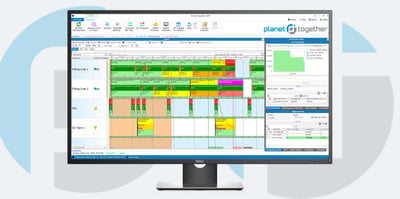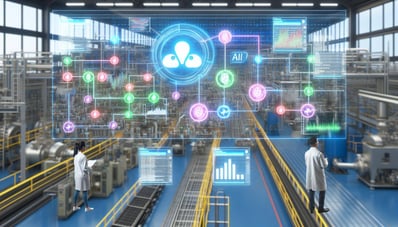Procurement Workflows with AI-Driven Process Automation
From managing supplier relationships to ensuring uninterrupted supply chains and controlling costs, the role of a Purchasing Manager is integral to the operational efficiency and profitability of a manufacturing facility. Leveraging advanced technologies such as Artificial Intelligence (AI) and integrating systems like PlanetTogether with major ERP, SCM, and MES systems, including SAP, Oracle, Microsoft Dynamics, Kinaxis, and Aveva, can significantly enhance procurement workflows.
This blog explores how AI-driven process automation can transform procurement in chemical manufacturing, ensuring agility, cost efficiency, and strategic advantage.

The Role of AI in Procurement
Artificial Intelligence (AI) is reshaping how procurement departments operate in chemical manufacturing. AI automates routine tasks, predicts market trends, and offers insightful data-driven recommendations. By integrating AI into procurement workflows, managers can achieve higher accuracy, speed, and efficiency.
Predictive Analytics
AI excels in analyzing vast amounts of data to forecast trends and potential disruptions in supply chains. Predictive analytics can foresee supplier-related risks or identify opportunities for cost savings, allowing procurement managers to make proactive decisions.
Automated Procurement Processes
Routine tasks such as purchase order creation, invoice processing, and compliance checks can be automated using AI. This not only speeds up processes but also reduces the likelihood of human error, freeing up managers to focus on more strategic tasks.
Enhanced Supplier Management
AI-driven tools can provide real-time insights into supplier performance and risk management. By continuously monitoring and evaluating supplier data, AI helps in maintaining robust supplier relationships and ensures compliance with regulatory standards.

Integrating PlanetTogether with ERP Systems
PlanetTogether’s Advanced Planning and Scheduling (APS) software is a critical tool for manufacturers looking to optimize their production schedules and inventory management. Integrating this tool with various ERP, SCM, and MES systems amplifies its capabilities, particularly in procurement.
SAP Integration
Integrating PlanetTogether with SAP allows for a seamless flow of information between production scheduling and procurement. SAP’s powerful ERP capabilities, combined with PlanetTogether’s scheduling insights, enable procurement managers to adjust purchasing based on production needs and timelines, optimizing both inventory levels and cost management.
Oracle and Microsoft Dynamics
Similar benefits are seen when integrating PlanetTogether with Oracle or Microsoft Dynamics. These systems support comprehensive procurement modules that, when combined with APS data, enhance purchase accuracy and timing. This integration ensures that procurement aligns more closely with production schedules and inventory requirements.
Kinaxis and Aveva
Kinaxis delivers sophisticated supply chain management solutions that, when integrated with PlanetTogether, provide a holistic view of both supply and demand. Aveva, focusing more on industrial software, complements this by optimizing operations and maintenance. Together, these integrations support a more synchronized procurement process that is responsive to real-time manufacturing dynamics.

Challenges and Solutions
While the integration of AI and advanced planning systems presents numerous benefits, it also comes with challenges such as data silos, change management, and system compatibility.
Overcoming Data Silos
Effective integration requires a unified data architecture where information from disparate systems can be accessed and analyzed comprehensively. Employing middleware solutions or utilizing APIs can help bridge these gaps, ensuring data fluidity and accessibility.
Managing Change
Introducing AI and new software integrations involves significant changes in workflow and operations. Training and change management programs are essential to help staff adapt to new technologies and processes effectively.
Ensuring System Compatibility
Compatibility between different systems can be a technical barrier. Working with IT specialists and vendors to ensure that the systems are compatible or can be made compatible through customizations is crucial.
The integration of AI-driven process automation and advanced planning systems like PlanetTogether with ERP, SCM, and MES systems transforms procurement workflows in the chemical manufacturing industry. By enhancing predictive analytics, automating routine tasks, and improving supplier management, these technologies enable procurement managers to not only optimize operational efficiencies but also contribute strategically to their organizations’ success.
As the industry continues to evolve, staying ahead in technology adoption will be key to maintaining competitive advantage and achieving sustainable growth. Are you ready to take your manufacturing operations to the next level? Contact us today to learn more about how PlanetTogether can help you achieve your goals and drive success in your industry.


